REVIVING THE LOCAL WISDOM OF MENTAWAI CULTURE
Last week we sat down with Fransiskus Yan, the Head of Mentawai’s cultural education foundation, Yayasan Pendidikan Budaya Mentawai (YPBM), to discuss their self-managed education program and how they perceive the relationship and involvement with the Indigenous Education Foundation (IEF).
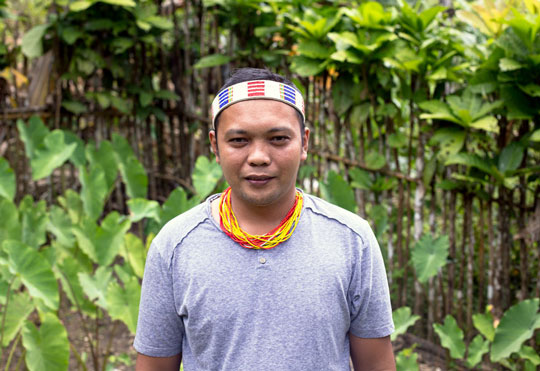
Can you help us understand the aspirations, fears and visions of your community?
The fear of our community is that future generations of Mentawai will no longer understand, recognize or benefit from the true wealth of our Indigenous culture. The influence of foreign development over the past few decades has resulted in the current generation of Mentawai children no longer learning or caring about our Mentawai customs.
Without our culture to guide and protect us, undoubtedly our people will become poor and our lives an ongoing struggle. For example, who will take care of our forest and important resources if our connection to culture is lost? For the Mentawai, nature and culture are one and the same – our forest won’t survive without Mentawai culture and vice versa. To combat this fear, our community aspires to safeguard our forest resources and culture of Mentawai for future generations. To do this, we’ve developed a new system of cultural and environmental-based education which gives our children opportunity to learn about Mentawai’s culture and local wisdom, so that this wealth can carry us into the future.
What are the needs of your community?
The need most critical to our community is the delivery of a Mentawai cultural education program throughout every region of Mentawai, designed in accordance with the specific needs and cultural customs of each individual district. Our cultural education foundation (YPBM) has developed a model to achieve this and, with the support of IEF, we have been able to implement this program in both the south and central Siberut Island sub-districts. However, to expand throughout all sub-districts of Mentawai, we are in need of additional funding to provide a central place of learning (cultural studio – sanggar), teaching/learning materials, and of course Mentawai teachers. In addition, we are also seeking better opportunity for our community to take advantage of these cultural skills and knowledge as a means to increase our economy and sustain our program. For example, the sale of our unique Mentawai tools and handicrafts being created as part of our program.
What is the relationship between IEF and YPBM?
YPBM and IEF have developed a partnership over many years to enable our Mentawai Foundation team and community the opportunity to implement our cultural and environmental education program. Working together, we are able to achieve our vision of taking steps to preserve our identity and culture through education and by understanding our past and sharing our memories with this and future generations of the community. We are proud of our predecessors and the knowledge of the world, environment and our approach to life that they have bestowed upon us. The challenges that we face today are in many ways unprecedented. Globalisation, modernisation and the forces of the global economy have touched every inch of the earth. We feel that it is time to be active and resilient without fear. I see courage and a determination in the eyes of our community.
How long have you been working together with Rob and IEF?
YPBM Founder, August Tonggiat, and Rob Henry began working together in 2010-2011. In the early stages, Rob assisted August and a team of young Mentawai researchers to conduct a baseline survey in the Matotonan region, southern Siberut. The focus of the research was on various topics such as culture, education, health, environment, religion and local wisdom. The aim was to identify value that the community placed on Mentawai culture and the forest environment, and whether they had access to this education. By 2013, we had established a suku Mentawai cultural education foundation to develop a program providing access to cultural learning for the Mentawai community. With the support of IEF, we have been able to continue developing our strategy and moving closer toward achieving our goals.
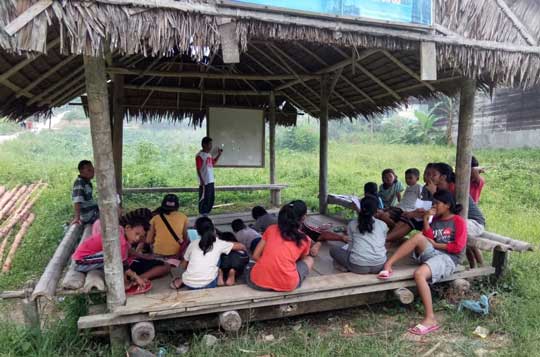
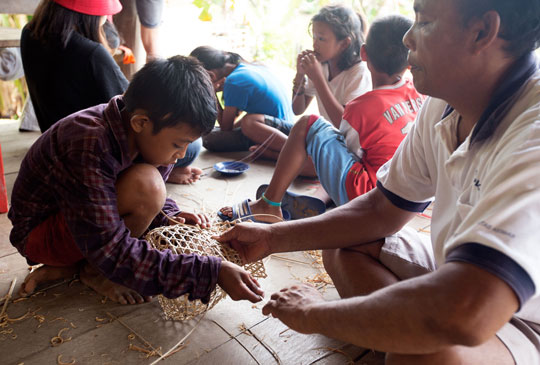
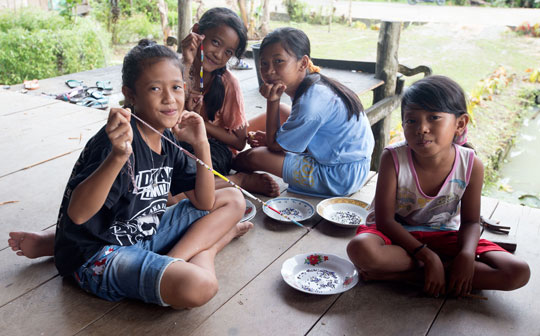
Why do YPBM need support from IEF or other partners?
Essentially, our Yayasan Pendidikan Budaya Mentawai (YPBM) team has developed a community-driven system and strategy for implementing the cultural learning program for current and future generations. However, the obstacle we faced was how are we to get the resources and facilities to capture our unique cultural and environmental knowledge and share this with our community? We understand the challenge and the values that exist in our community. What we lacked was a structure to put these things together and be able to share them with our children, and ultimately with the world outside. This is why our relationship with IEF is so important to us. They help fill the small gaps that allow us to achieve our vision and mission.
What impact has IEF support had on YPBM and the Mentawai community?
We have seen a really positive impact on our Mentawai community – particularly the younger generation, since the cultural and environmental learning program has been running here in Siberut Island (Mentawai), The program, which is taught outside of formal school hours, is now running in 5 different villages and we have over 120 students. Through our program the students are learning about our culture and how to utilise our important natural resources on their own, even without the instruction of their parents – who are very supportive that their children take part in this YPBM cultural program.
The support from IEF has been crucial and extremely impacting and is felt by the community. For example, they’re seeing their children develop new skills and understanding of our cultural wisdom, such as gathering from the forest, making handicrafts, and learning Mentawai’s traditional story, song and dance. Prior to taking part in this program, most students were embarrassed to perform our cultural art or even ask their parents / elders for cultural explanations because they thought that this knowledge was useless. Now, parents are seeing their children become proud and confident in their identity and willing to showcase their knowledge – even at public events. For example, last year we took a team of students from Saibi Samukop to perform at an Indigenous Celebration Festival event in Bali, alongside Indigenous groups from all over the Asia Pacific. These students were so confident and empowered because they understood the meaning of the dances / music and had the skills to perform.
The student groups participating in our Foundation’s cultural education program are enjoying gathering together each week to study culture and the benefits of our natural resources – such as medicinal plants, food / drink, and building (canoe, house, baskets, etc.). They now take interest and care in wanting to learn about our cultural heritage; whereas, previously, they would return home from school with no real meaningful activity to do.
Parents are so proud and encouraging of their children to take part in the cultural program because it has previously been very difficult for them to educate their children in this way. The parents / elders have also drawn inspiration from our program and from the impact this is having on their children. In particular, there is a new-found confidence and pride in their teaching, promoting and protecting the rights of their Indigenous community and culture. This includes standing up against people or large companies who are wanting to take control of our land, culture and natural resources without consideration of our rights. Without understanding and respecting the value of our culture and land, our people are vulnerable and this almost always results in serious conflict and segregation. In support of the community, we are helping to form a committee of Mentawai Indigenous leaders who can represent the Mentawai people locally, nationally and internationally in our protection of Indigenous cultural knowledge, land and resources.
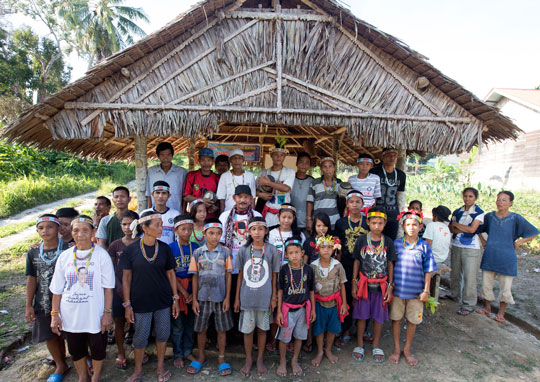
What is your vision for the future of Mentawai culture, environment and the program?
My vision for the future of the education program is to create access for the Mentawai community to reconnect with our culture, and to increase participation and knowledge about our culture and environment. In addition, we hope to develop Mentawai cultural education centres and a system of ecotourism that brings benefit to all equally. Most importantly, we hope the Mentawai community will have the capacity, knowledge, motivation and opportunity to continue strengthening the connection to our culture, environment and identity for years to come. This has found expression in the cultural learning studios that teach our children and will also provide opportunity for foreign groups to travel to Mentawai for their own comparable education and study – including student groups from primary school through to university. This is one important instance of how we can experience our connection to culture and identity to share with many others across the globe.
Why is the work of YPBM important for Mentawai community?
It is important because if we do not take the initiative and take advantage of this opportunity then our culture will be lost and our children and community will be destined for poverty, or worse, disappear. An impoverished culture is as harmful as abject poverty. It is important to take the initiative because the community understand the importance of an education for their children. They can see and feel the positive impact of our program. As a result, their children now have the knowledge and skill to gather resources and make Mentawai’s unique handicrafts and tools for survival. Previously, they didn’t know how to do this and so the mindset of the children changes – they become more confident, enthusiastic and appreciative of our traditional knowledge and life in general.
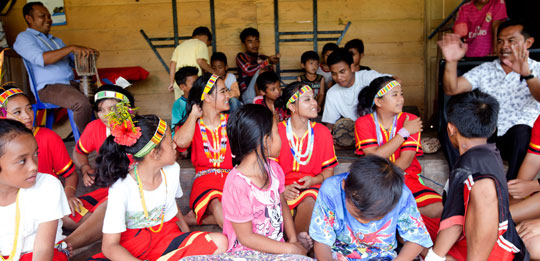
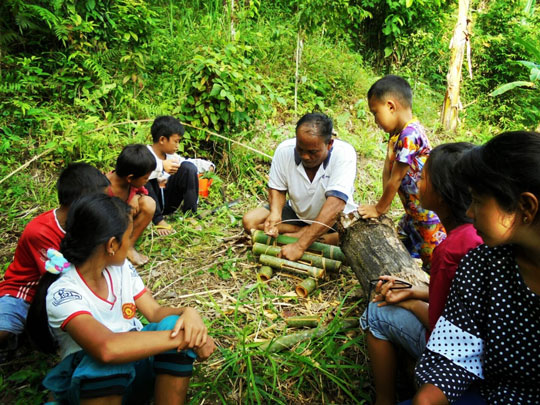
What kind of responses have you received from the Mentawai community about the program?
Mentawai community is in strong support of the program because all this time we — the Mentawai people — have not had access or the opportunity to learn about our culture. Earlier generations did not believe or know that we could change that situation. We had to overcome our differences and adapt to learn how to alter our situation on terms that accord to our traditions and provide comfort. Through the YPBM program, the community believe that they will gain important knowledge and connection to the enduring aspects of our identify and enrich our lives into the future.
What is your opinion about IEF and their approach to supporting Mentawai culture?
We are very grateful for IEF as their strategy allows us to obtain certain things that are needed by the Mentawai community, but very difficult for us to find alone – such as finding the resources and know-how to promote our initiative throughout Mentawai and beyond. This partnership has allowed us to grow our initiative and develop our program. It has also allowed us to reach out to others and develop our own networks of support from Indonesia and around the world.
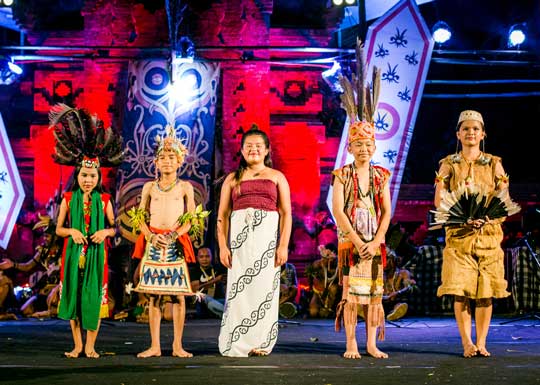
Any final comments?
We are extremely encouraged by the response in our community. Students feel confident about their identity and are encouraged to stand up without fear or anxiety. They have embraced their identities, memories and traditions. They can confidently enjoy their culture and identity and share it with the world beyond. The community has reawakened to the possibilities that they never thought were conceivable. The treasures of their ancestors, their memories and wisdom can be passed on to this and future generations. We are very grateful that the relationship between YPBM and IEF has always been open, honest and focuses on enabling us Mentawai to find our own way forward. Rob is now considered ‘saraina ta’ – part of our Mentawai family, and we appreciate the way in which he and the IEF have supported us, but it was the encouragement to be as we are and to assert ourselves that has made the difference. We hope that the program will continue to empower our children and community and provide positive impact for the future.
Masurak bagatta, thank you.
YPBM











